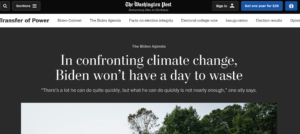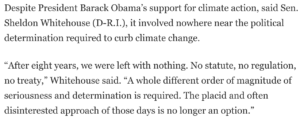https://www.washingtonpost.com/politics/2020/12/22/biden-climate-change/?arc404=true
“Folks, we’re in a crisis,” Biden said Saturday in announcing a diverse team of advisers focused on the problem. “Just like we need a unified national response to covid-19, we need a unified national response to climate change. We need to meet this moment with the urgency it demands.”
For Biden, the relentless pressure from activists within his party was not the only motivation to act aggressively. A warming planet has made the issue increasingly hard to ignore, as the litany of climate-related catastrophes has grown with each passing year.
…
Despite President Barack Obama’s support for climate action, said Sen. Sheldon Whitehouse (D-R.I.), it involved nowhere near the political determination required to curb climate change.
“After eight years, we were left with nothing. No statute, no regulation, no treaty,” Whitehouse said. “A whole different order of magnitude of seriousness and determination is required. The placid and often disinterested approach of those days is no longer an option.”
…
Already, Biden’s team is sketching out executive orders aimed at mobilizing the entire federal government to combat climate change and environmental injustice, according to three people familiar with his plans who spoke on the condition of anonymity because they have not yet been announced.
Biden has vowed to rejoin the Paris climate accord on his first day as president, and convene a climate summit of world leaders within his first 100 days in office. He has insisted that he will create a more ambitious national target for cutting emissions that would “put the country on a sustainable path to achieve net-zero emissions no later than 2050.″
The slogan “1.5 Degrees” is projected on the Eiffel Tower as part of the U.N. Climate Change Conference in Paris in December 2015. (Francois Mori/AP)
At the same time, Biden plans to start a new round of negotiations between the federal government, the U.S. auto industry and California officials to significantly improve the fuel efficiency of cars, pickup trucks and sport-utility vehicles — the largest source of the nation’s emissions. He will expedite federal permits for offshore wind projects planned along the Eastern Seaboard, and seek to stop the expansion of drilling on public land.
He has promised an unprecedented focus on environmental inequity, promising to invest 40 percent of clean energy funding in historically disadvantaged communities and ensure wider access to everything from safe drinking water to sustainable jobs in neighborhoods that have long lacked both. He has proposed creating a “Civilian Climate Corps” to help make communities less vulnerable to wildfires and floods.
[Extreme climate change has arrived in America]
“We will be driven by our convictions that every person in our great country has the right to clean air, clean water and a healthier life, no matter how much money they have in their pockets, the color of their skin or the community that they live in,” Michael S. Regan, Biden’s pick to run the Environmental Protection Agency, said on Saturday.
…
Although he has placed moderates elsewhere in his Cabinet, Biden’s environmental picks have been more progressive. His selection of Rep. Deb Haaland (D-N.M.) to head the Interior Department sparked an outpouring of support from Indigenous communities and environmental justice advocates. Obama administration veteran Brenda Mallory, an environmental lawyer and activist, will be the first Black chair of the White House Council on Environmental Quality in its 50-year history. And Regan, who as North Carolina’s top environmental official has worked to clean up toxic coal ash near low-income areas, would be the first Black man to head the EPA.
Several picks that traditionally don’t focus on the environment — including treasury secretary nominee Janet Yellen, Transportation secretary nominee Pete Buttigieg and National Economic Council director Brian Deese — have called for deeper cuts in greenhouse gas emissions.
And in choosing former EPA administrator Gina McCarthy and former secretary of state John F. Kerry as his top domestic and international climate advisers, respectively, the incoming president has surrounded himself with officials who view the Earth’s warming as a crisis.
Although Biden has vowed to move quickly and forcefully, his agenda faces obstacles.
He will be able to make some key changes with the stroke of a pen. But other efforts will undoubtedly face legal challenges that must wind through a federal court system now stacked with Trump appointees. And the most ambitious goals to curb climate change and fund clean-energy technologies will need the approval of a deeply divided Congress.
…
And even though control of the Senate remains unresolved, Republicans on Capitol Hill remain wary of any government mandates to reduce U.S. emissions.
“There are ways we can protect our environment without punishing our economy. Free market innovation — not government taxation or heavy-handed regulations — is the best way to deal with climate change,” Sen. John Barrasso (R-Wyo.), chairman of the Senate Environment and Public Works Committee, said in a statement. “We have passed bipartisan bills that will promote carbon capture technologies, advanced nuclear reactors, and reduce emissions, while allowing our economy to grow.”
Fred Krupp, president of the advocacy group Environmental Defense Fund, said in an interview that support for moving the U.S. auto fleet to all-electric “has more potential for bipartisan cooperation as part of a recovery act than almost anything else.”
Lawmakers from both parties also have an incentive to back the manufacturing of advanced batteries, he added, which could further Biden’s goal of curbing transportation emissions. “This could be a huge boon for jobs in the heart of the country, and we need jobs there,” Krupp said.
Striking a broad agreement with the power sector, which Biden has pledged to make carbon-free by 2035, could be more difficult. Utilities are already phasing out coal-fired plants and expanding their sources of renewable electricity, but not as quickly as the president-elect has outlined. And the EPA’s effort under Obama to impose stringent carbon cuts was temporarily stopped by the Supreme Court before the Trump administration reversed it.
Still, EPA could limit traditional pollutants that could pressure companies to shut down fossil fuel-powered operations anyway. John Walke, who directs the Natural Resources Defense Council’s Clean Air, Climate and Clean Energy Program, said the agency could tighten restrictions of toxic ash and water discharge from coal plants, and reassess whether the cancer risk associated with such plants’ emissions justifies new pollution controls.
The Kanawha River coal-fired power plant located in Hansford, W.Va., closed in 2015. (Stacy Kranitz for The Washington Post)
Using a 2007 law requiring all new and major renovations of federal buildings to have net-zero carbon pollution by 2030, the new administration can spur a wave of environmentally friendly construction.
Some Trump administration policies, however, will take years to undo. Justin Schwab, who served as EPA’s deputy general counsel from 2017 to 2019, said that the case law established during recent years makes clear that delaying or unwinding a regulation can’t be rushed.
“The next administration will also likely find there’s no quick way to roll back its predecessor’s legacy,” Schwab said.
Jody Freeman, a Harvard environmental law professor and former Obama climate adviser, agreed that Biden must temper expectations, which don’t always match the bureaucratic reality.
“If you get a few major greenhouse gas rules finished before the midterms, that would be a major accomplishment,” she said. “But you can’t push them too fast. There’s this balancing act, going fast enough to get things done, but not so fast that you create legal risk.”
At the same time, Biden will face unrelenting pressure from the left to move quickly, even if the new administration lacks the votes in Congress to lock in durable changes.
Xiye Bastida, 18, who is based in New York City and co-founded the Re-Earth Initiative during the coronavirus pandemic, said that although she and other young activists are encouraged by many of Biden’s appointments, the nation needs to move faster.
“We definitely want more ambition on the deadline,” Bastida said, adding that the world must make deep cuts to keep the planet from warming 1.5 degrees Celsius (2.7 degrees Fahrenheit). “We cannot spend the next seven years talking about what we need to do. We need to start doing it.”




